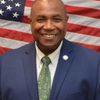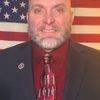Joseph Cohn
Joseph Cohn (Democratic Party) ran for election to the U.S. House to represent New Jersey's 3rd Congressional District. He lost in the Democratic primary on June 4, 2024.
Cohn completed Ballotpedia's Candidate Connection survey in 2024. Click here to read the survey answers.
Biography
Jospeh Cohn was born in East Chicago, Indiana. Cohn earned a bachelor's degree from the University of Nevada, Las Vegas in 2000, a graduate degree from the University of Pennsylvania Fels Institute of Government in 2004, and a law degree from the University of Pennsylvania Law School in 2004. His career experience includes working as an attorney and ACLU legal director. He has been affiliated with the ACLU of Nevada, the ACLU of Utah, the Foundation for Individual Rights and Expression, and Freedom Barks, Inc.[1]
Elections
2024
See also: New Jersey's 3rd Congressional District election, 2024
New Jersey's 3rd Congressional District election, 2024 (June 4 Democratic primary)
New Jersey's 3rd Congressional District election, 2024 (June 4 Republican primary)
General election
General election for U.S. House New Jersey District 3
The following candidates ran in the general election for U.S. House New Jersey District 3 on November 5, 2024.
Candidate | % | Votes | ||
| ✔ |  | Herbert C. Conaway Jr. (D) | 53.2 | 202,034 |
 | Rajesh Mohan (R)  | 44.7 | 169,454 | |
 | Steven Welzer (G)  | 0.9 | 3,478 | |
 | Chris Russomanno (L)  | 0.5 | 1,951 | |
 | Douglas Wynn (Why Not Wynn Party)  | 0.4 | 1,332 | |
 | Justin Barbera (Join The Revolution Party)  | 0.3 | 1,235 | |
| Total votes: 379,484 | ||||
 = candidate completed the Ballotpedia Candidate Connection survey. = candidate completed the Ballotpedia Candidate Connection survey. | ||||
| If you are a candidate and would like to tell readers and voters more about why they should vote for you, complete the Ballotpedia Candidate Connection Survey. | ||||
Do you want a spreadsheet of this type of data? Contact our sales team. | ||||
Democratic primary election
Democratic primary for U.S. House New Jersey District 3
Herbert C. Conaway Jr. defeated Carol Murphy, Joseph Cohn, Sarah Schoengood, and Brian Schkeeper in the Democratic primary for U.S. House New Jersey District 3 on June 4, 2024.
Candidate | % | Votes | ||
| ✔ |  | Herbert C. Conaway Jr. | 49.6 | 27,528 |
 | Carol Murphy | 25.3 | 14,049 | |
 | Joseph Cohn  | 11.7 | 6,517 | |
 | Sarah Schoengood  | 10.0 | 5,524 | |
 | Brian Schkeeper  | 3.4 | 1,862 | |
| Total votes: 55,480 | ||||
 = candidate completed the Ballotpedia Candidate Connection survey. = candidate completed the Ballotpedia Candidate Connection survey. | ||||
| If you are a candidate and would like to tell readers and voters more about why they should vote for you, complete the Ballotpedia Candidate Connection Survey. | ||||
Do you want a spreadsheet of this type of data? Contact our sales team. | ||||
Withdrawn or disqualified candidates
- Andrew Kim (D)
- Alexander Hammerli (D)
Republican primary election
Republican primary for U.S. House New Jersey District 3
Rajesh Mohan defeated Shirley Maia-Cusick, Michael Francis Faccone, and Gregory Sobocinski in the Republican primary for U.S. House New Jersey District 3 on June 4, 2024.
Candidate | % | Votes | ||
| ✔ |  | Rajesh Mohan  | 38.0 | 13,011 |
 | Shirley Maia-Cusick | 30.7 | 10,507 | |
 | Michael Francis Faccone  | 17.0 | 5,812 | |
 | Gregory Sobocinski | 14.4 | 4,947 | |
| Total votes: 34,277 | ||||
 = candidate completed the Ballotpedia Candidate Connection survey. = candidate completed the Ballotpedia Candidate Connection survey. | ||||
| If you are a candidate and would like to tell readers and voters more about why they should vote for you, complete the Ballotpedia Candidate Connection Survey. | ||||
Do you want a spreadsheet of this type of data? Contact our sales team. | ||||
Endorsements
Ballotpedia did not identify endorsements for Cohn in this election.
Campaign themes
2024
Ballotpedia survey responses
See also: Ballotpedia's Candidate Connection
Joseph Cohn completed Ballotpedia's Candidate Connection survey in 2024. The survey questions appear in bold and are followed by Cohn's responses.
| Collapse all
Joe grew up in Las Vegas, Nevada where he attended public schools. After graduating cum laude from the University of Nevada at Las Vegas, Joe moved to Philadelphia where he earned his law degree from the University of Pennsylvania School of Law and his Masters in Government Administration from its Fels Institute of Government in 2004.
Joe met his partner Veronica while they were both studying for the bar exam. They lived in Philadelphia until 2008 when they moved to New Jersey. Since 2014, Joe and Veronica have been living on their small farm in Lumberton, New Jersey with their collie, cats, and horses.
During his 20 year legal career, Joe has worked to relentlessly advance the rights of all people. As a lawyer at the AIDS Law Project of Pennsylvania, he fought to keep roofs over the heads of people with HIV and AIDS. As a volunteer lawyer, he represented asylum seekers looking to America for a life free from political violence. Serving as the legal director at two ACLU affiliates, he defended the rights of street performers, environmentalists, Occupy Salt Lake City activists, LGBTQ students, and prisoners who were gassed in their cells.
For the last dozen years, through his work at FIRE, Joe has defended the free speech rights of people on every part of the political spectrum.- I believe that we must get beyond our divisions to move our country forward. I reject the notion that my neighbors can be separated into “good vs. evil,” based on their voter registration and will focus on ways we can work together to solve real problems that affect our communities.
- In Congress, I will work hard to protect reproductive rights and civil liberties. I've spent 20 years as a civil rights lawyer and I have a history of successfully defending reproductive freedom and civil liberties . In states with Republican majority legislatures, I have secured big victories by leading successful campaigns against bills that would forbid students and professors from discussing racial equality in college classrooms; that would outlaw conversations in states that have banned abortion about where women could obtain abortions lawfully; and I successfully urged the Governor of North Dakota to issue a line item veto of budget provision that would have banned colleges from using state resources to host pro-choice speakers.
- If I am elected I will do everything I can to end the chaos in Washington and defend democracy itself from those that would attack the press, attempt to overturn elections, and build barriers to voting.
Never in my lifetime has our Democracy been under such pressure from extremists. In order to defend it, we must elect people who will fight for everyone's rights and who recognize that our biggest national security threat is our inability to work together across our differences.
Throughout my career, I have worked tirelessly to build bipartisan support for civil liberties. If I'm elected, I will continue to work tirelessly to build a coalition of the reasonable focussed on solving our nation's most pressing problems.
Another crucial priority for Congress is defending reproductive freedom, the right to birth control, and care like IVF treatments.
Another book that has shaped my thinking is Jonathan Rauch's masterpiece, the Kindly Inquisitor. In it Mr. Rauch explains why dialogue and free speech are such necessary components of discovering truth. We cannot solve problems without understanding their contours and we cannot reach understandings when viewpoints are suppressed. To determine which arguments are persuasive, we must subject them to scrutiny. It's this process of scrutinizing arguments that helps us determine which are strongest.
The best lawmakers work tirelessly to meet with and hear from their constituents in order to understand their needs.
The elected officials I respect the most work hard to understand the competing arguments. They are open minded about working with others with whom they have disagreements. They try their best to build on common ground.
Members of Congress must constantly work to move America forward by addressing the key challenges it faces.
Unfortunately, lately our Congress has been broken. Members prioritize their party and their re-elections over the needs of our citizens. Several times last year, members of Congress challenged witnesses in hearings to fights. Republicans killed an immigration reform deal that had strong bipartisan support, after former President Donald Trump urged Republican members of Congress to kill the deal, so that President Biden could not share credit for addressing a pressing need. This type of electoral gamesmanship must end because Congress's core responsibility is to legislate. When Congress fails to legislate our problems remain unsolved or the executive branch often steps in to fill the void. Without legislation, the executive branch sometimes oversteps its authority. It is Congress's responsibility to perform its legislative function to avoid this problem.
Another key responsibility of Congress is its oversight function. The legislative branch provides a key check and balance by ensuring that the other branches don't abuse their power. But Congress must exercise this authority with integrity, which requires avoiding wild goose chases, like the ongoing impeachment investigation into President Biden, despite the complete lack of evidence to proceed.
I want to be remembered for championing policies that lift people out of poverty and help our struggling middle class secure their financial futures. This includes providing funding for childcare, driving down healthcare costs, making it easier for people to save for retirement, and thoughtfully reducing the burdens of student debt.
I also want to be a driving force behind securing protections for the environment. And because they do not have a voice of their own, I want to be a consistent advocate for the rights of animals.
When I was 18, I volunteered for a political campaign and was quickly hired by Dan Hart and Associates, the firm representing the candidate. The position was entry level, but the firm represented elected official on the local, state, and federal levels. It also represented advocacy organizations like the National Environmental Trust, the Sierra Club, and the Campaign for Tobacco Free Kids. It was exciting work that helped teach me the importance of grassroots advocacy and community organizing.
In my adulthood, I really enjoyed:
Doris Kearns Goodwin's biography of Abraham Lincoln, Team of Rivals , which helped shape my political philosophy.
The Devil in the White City by Erik Larson which was just gripping from beginning to end.
Daniel Kahneman's Thinking Fast and Slow which taught me so much about logical reasoning.
The Color of Water by James McBride which paints such a compelling picture of the complexities of race, religion, and family in America.
To Kill a Mockingbird by Harper Lee which underscored the crucial need for due process and the inequity of our criminal justice system.
As a civil rights and civil liberties attorney who has fought censorship in legislatures across the country, I have often had to convince the majority party to vote no on one of its own bills that would have censored their adversaries. This is because people in power tend to try to censor those with whom they disagree, and not their allies. Consistently throughout my career I have beaten bills that would have censored those in the political minority. For example, in 2023 I led a campaign against a DeSantis-backed Florida bill that would have rolled back the freedom of the press. Republicans had the numbers to ram the bill through, but were convinced to kill the bill. I also was instrumental in securing a line-item veto of a part of an appropriations bill in North Dakota that would have made it criminal for a college employee to enter into a contract for their school to pay to bring a pro-choice speaker to campus.
I am the only candidate in the race who has been able to secure victories for issues that matter for Democrats in places Republicans had the majority.
With limitations on voting rights, manipulation of ballots, attacks on the press, bans on what can be taught in college classrooms, or bans on books in libraries, online censorship, extremists willing to resort to political violence, and the candidacy of Donald Trump, who tried to dismantle our system's checks and balances, at no point in my lifetime has our democracy been under such serious threat.
I also admire the late Representative John Lewis whose leadership on civil rights was a personal inspiration.
We owe our freedoms to men and women like him who served our nation, and too much is at stake now for us to tear our democracy apart through our divisions. I'll work as hard as I can to help heal our country so we can work on the many real challenges we face together.
While out canvassing in Evesham Township, I met a woman who needed a late-term abortion to save her life. She desperately wanted the child, but to bring the pregnancy to term would have killed her. Fortunately, she lived in New Jersey, where she could get the procedure, but there were only two doctors in the state who could perform it. Making matters worse, the insurance company deemed the procedure “elective,” despite the fact that she would have died without it. This designation meant that the insurance would cover only a fraction of the costs. She is still fighting the insurance company today. Her story underscores how important it is—especially in light of the Dobbs decision—for Congress to provide a federal right to reproductive care.
In a diverse Democratic society, compromise is necessary in order to make policies that reflect the broad array of American viewpoints. One of the biggest problems in American politics today, is our political leaders' unwillingness to negotiate in good faith and make meaningful compromises that move the nation forward.
Note: Ballotpedia reserves the right to edit Candidate Connection survey responses. Any edits made by Ballotpedia will be clearly marked with [brackets] for the public. If the candidate disagrees with an edit, he or she may request the full removal of the survey response from Ballotpedia.org. Ballotpedia does not edit or correct typographical errors unless the candidate's campaign requests it.
Campaign finance summary

See also
2024 Elections
External links
|
Candidate U.S. House New Jersey District 3 |
Personal |
Footnotes
- ↑ Information submitted to Ballotpedia through the Candidate Connection survey on April 23, 2024








